#Ptolemy-class
Text

Someone, bless their heart, colored a page from the Starfleet Technical Manual by Franz Joseph.
This page depicts a portion of Starfleet Headquarters, which Joseph imagined as a large staircase in orbit over Earth. This later became, albeit with major design changes, the Spacedock facility seen in various Star Trek films and series since Star Trek lll: The Search For Spock (1984).
#Star Trek#Star Trek: The Original Series#Starfleet Technical Manual#Fleet Headquarters#U.S.S. Hermes#NCC-585#Hermes-class#scout ship#U.S.S. Constitution#NCC-1700#Constitution-class#heavy cruiser#U.S.S. Ptolemy#NCC-3801#Ptolemy-class#transport/tug#Starfleet#Starfleetstarships#starships#Franz Joseph
13 notes
·
View notes
Text

Convoy Escort by muddychickn
63 notes
·
View notes
Text
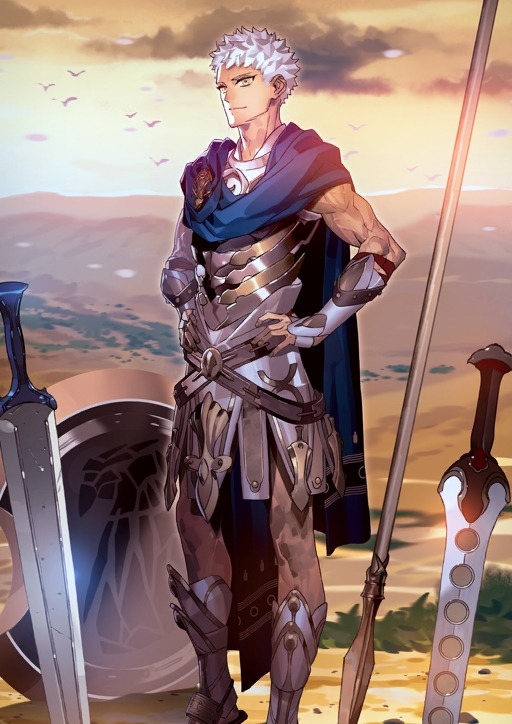


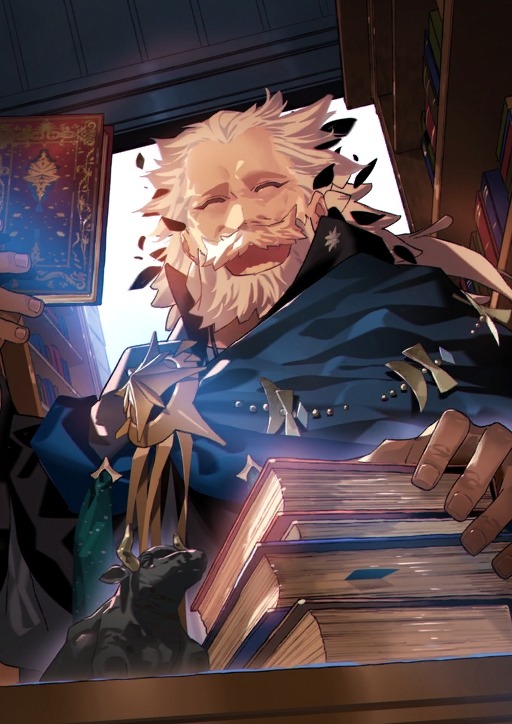
Archer class Ptolemaios for the Grail Front ~White Castle by Day, Black Castle by Night~ campaign in Fate Grand Order.
Illustrator: Shizuki Morii
#ptolemaios#ptolemy#fate go#fgo#fate grand order#fate series#game#servant#mobile game#fate#official art#typemoon#art#archer class#archer#archer servant#character#fate servant#fate / grand order#fate/grand order#fate/go#official artist#artist#lasengle#TYPE-MOON#type moon#official illustration#official illustrator#illustrator#illustration
61 notes
·
View notes
Text



Oh look, another WIP, just what I need
5 notes
·
View notes
Text
white pharaoh is crazy to me bc you can't even say "ohhh the ptolemies were white so white pharaoh isn't totally inaccurate" bc he's just SOOO white that he can't even be compared to the ptolemies. he's in a new category of white. most aggressively upper middle class white american picture I have seen in my life the smirk exudes golf player energy I can't explain it.
147 notes
·
View notes
Photo

Growing Old in Ancient Greece & Rome
Although life expectancy was lower in ancient Greece and Rome, many people survived into old age. Those who reached old age tended to accumulate wealth and political power. However, the societies of the ancient Mediterranean were also often hostile to the visibly aged and infirm. The experience of old age in antiquity, and the extent to which the elderly were marginalized by society, depended on their wealth, gender, and social class.
Reaching Old Age in Antiquity
Contrary to popular belief, people in the ancient world did not have extremely short lifespans. Although the average life expectancy in the ancient world was between 20 and 30, this statistic is skewed by very high rates of infant mortality. Almost everyone who survived childhood would live to middle age, and it was not uncommon for people to reach their 60s and 70s. However, before modern medicine, lifespans were still shorter and health concerns were more debilitating. Karen Cokayne estimates that approximately 1.6 % of Romans reached 80 years of age, and only 0.05% reached 90.
in antiquity, there was no strict definition of old age or a formal retirement age. Instead, the transition from middle age to old age varied between individuals, based on their health and social life. In ancient Greece and Rome, the onset of old age was generally considered to begin around the age of 60 for men and around 50 for women. These ages corresponded to the time when people began to have difficulty performing physical labor, and when women typically reached menopause. Men were also excused from mandatory military and civic service after this age. These changes signaled the end of childbearing and the ability to fully participate in agricultural work, meaning that people could shift to a new role in the community, with a different set of social responsibilities.
brings about the renunciation of manual labour, toil, turmoil, and dangerous activity, and in their place brings decorum, foresight, retirement, together with all-embracing deliberation, admonition, and consolation; now especially he brings men to set store by honour, praise, and independence, accompanied by modesty and dignity.
(Tetrabiblos, 4.8.206)
The Athenian statesman Solon (c. 640 to c. 560 BCE) considered the average lifespan to be 70 years, which could be divided into seven phases of life. The astronomer Claudius Ptolemy of Alexandria (c. 100-170 CE), in his astrological treatise, the Tetrabiblos, similarly divided the human lifespan into seven phases of 12 years. The final stages of life were associated with old age, when men stepped away from hard labor and risk-taking, to focus on retirement and wiser decision-making.
Continue reading...
56 notes
·
View notes
Text
🎵 Precinct 41 Major Crimes Unit
"*SIX* years?"
JEAN VICQUEMARE - "Yeah... Or seven? You're not doing too good there. It's an old-man thing. Two *old-years* equals one normal year. That -- and Dora Ingerlund really tore you a new one. A big one."
"Who was she?"
"*Now* I've heard enough."
JEAN VICQUEMARE - "Incredibly bangable?"
"Are you *seriously* using this moment to assert male privilege!?!"
"Huh?"
"Figures."
"No, I meant -- what did she do?"
KIM KITSURAGI - "He is very passionate about this."
JEAN VICQUEMARE - "Okay, you're right. She was extremely fuckable, Harry. Gorgeous. A gorgeous bourgeois woman. Waifish. Like a *welkin* basically."
CONCEPTUALIZATION [Medium: Success] - Snow Welkin. Blonde Welkin...
INLAND EMPIRE [Easy: Success] - Heartbreak Welkin.
PAIN THRESHOLD [Medium: Success] - Pain Welkin.
JEAN VICQUEMARE - "I've only seen a picture -- but it's obvious you formed a real spiritual connection with how *pretty* she was. One you never recuperated from."
JUDIT MINOT - "Look..." She turns to face the sea. "The sun is going down. It's time to go home."
JEAN VICQUEMARE - "I think she taught in the Académie des Arts, east of the river. Way east. Hard to say which came first -- the middle class chick or the drink? Egg and the chicken kinda thing..."
"My point is, you need to see a *psychiatrist* about this shit. Not a psychologist -- several degrees harder. Is there's something harder than a psychiatrist?" He pauses to think. "A forensic psychiatrist. Go talk to that."
RHETORIC [Medium: Success] - In other words -- he's heard *enough* about this.
3. "Okay. Am I a dirty cop working for La Puta Madre?"
JEAN VICQUEMARE - "No."
"No? Because a suspect seemed to think..."
"Okay then."
JEAN VICQUEMARE - "You're too unstable to work for a mob boss. You're suicidal, Harry. No mob boss would take you."
+5 XP
TRANT HEIDELSTAM - "I assure you -- I wouldn't consult for a corrupt unit."
LOGIC [Medium: Success] - He would immediately backpedal out of it.
VOLITION [Easy: Success] - I told you it's not that bad.
4. "Precinct 41… what kind of station is it?"
JEAN VICQUEMARE - "Us? We're the *Bloody Murder Station*, haven't you heard? We're the bad guys. No one likes us."
KIM KITSURAGI - "That's not true. Jamrock is too big for one precinct. You're just understaffed. And everyone respects the 41st -- you have Captain Pryce."
JEAN VICQUEMARE - "Thank you, lieutenant. You're being kind. It *is* an understaffed station and the district *is* too big -- which is why we need to..." He tilts his head northward...
JUDIT MINOT - "... get back to it. We left Torson and McLaine to run the C-Wing. It's not good."
"Torson and McLaine?"
"And the C-Wing is…"
"And Pryce is..."
"Did we recently shoot up a church by any chance?" (Point to the church.)
"So I work in the Bloody Murder Station?" (Conclude.)
JUDIT MINOT - "Mack 'The Torso' Torson and Chester McLaine --" She arches an eyebrow. "They're not fit to run a wing. Believe me. Things are shaky as it is."
CONCEPTUALIZATION [Medium: Success] - They *are* damn iconic though -- Torson and McLaine!
"An iconic duo I take it?"
Not now.
JEAN VICQUEMARE - "Yeah -- not like *us*. Two clinically depressed old men. Where's the contrast here? We're garbage."
2. "And the C-Wing is…"
JEAN VICQUEMARE - "God..." He sighs. "There are four wings, Harry: A, B, C, and D. We're in C. It's made of losers and clock-punchers. You and I *re-conceptualized* it as a task force. It was a mistake."
TRANT HEIDELSTAM - "There's also a lot of outside help involved. Not only me." He smiles. "Other losers too."
SUGGESTION [Easy: Success] - He's anything but a loser. Although he would like to be seen as one. It's cooler that way.
3. "And Pryce is..."
JUDIT MINOT - "Ptolemy Pryce? He's the son of the old Pryce -- one of the founders of the RCM."
KIM KITSURAGI - "He's one of the most highly regarded men in the force. You're lucky."
ESPRIT DE CORPS [Easy: Success] - Somewhere under the curved roof of a former silk factory, shaped like a ladybird with two chimneys, Police Captain Ptolemy Pryce sits behind a heavy wooden desk. Resident medic Nix Gottlieb pours him coffee. It's silent in the captain's office...
They speak of change. The city. The tension on the streets. They speak of the events of April and the blood on the streets in May.
4. "Did we recently shoot up a church by any chance?" (Point to the church.)
JEAN VICQUEMARE - "So he remembers *that*... Yes, there may have been a raid on *some* churches. It wasn't good press."
TRANT HEIDELSTAM - "Shooting up churches never is. I was out of town, to be clear...."
"What happened? Why did we need to go there?"
JEAN VICQUEMARE - "Our *enemies* were hiding in *a* church -- to the best of our information. That's it. I'm not talking about this anymore. Your security clearance is *shit-tier* right now. You have to wait for it to go up."
+5 XP
AUTHORITY [Easy: Success] - He means it. The RCM and its enemies will not be discussed on this coast.
PERCEPTION (HEARING) [Challenging: Success] - Your clearance will not go up while you're within earshot of the Union headquarters.
5. "So I work in the Bloody Murder Station?" (Conclude.)
JEAN VICQUEMARE - "Okay -- it's not the Bloody Murder Station. It's an old converted silk mill with green desk lamps and a coffee corner. A lot of good people work there. Hard. Every day."
JUDIT MINOT - "Jamrock is the largest ghetto in Revachol. Faubourg, technically... but it's divided into *eleven* districts. Jamrock only has us."
KIM KITSURAGI - "The press will blow over," he says in a reassuring tone. "Jamrock is lucky to have you. And it's often considered to be the greatest of the districts -- you're lucky to have it."
JEAN VICQUEMARE - "Thank you again, lieutenant."
5. "The phasmid -- I need to tell Lena about this ASAP."
JEAN VICQUEMARE - "Who is Lena?"
ENCYCLOPEDIA [Easy: Success] - She lives at 1113 Tabernacle Road, in Jamrock. Remember?
"A cryptozoologist. She lives in Jamrock, on Tabernacle road. She told me about this phasmid."
"No one. Forget it."
JUDIT MINOT - "Tabernacle? It's on the way over. Near where you live, on Perdition..." She looks at Vicquemare.
JEAN VICQUEMARE - "Fine. If we're gonna drop you off anyway."
KIM KITSURAGI - "She and her husband were conducting the search for the phasmid. It's their discovery -- in part."
"They should know as soon as possible. It would do you good to deliver some positive news for a change."
SUGGESTION [Easy: Success] - She is going to be over the moon.
ENDURANCE [Medium: Success] - Watch out or she'll faint.
6. "Lieutenant Kitsuragi -- what will you do now?"
KIM KITSURAGI - "Well -- first I will go back to my station and write the most detailed report anyone has ever seen. It will have to be good to cover all this. Then I will have a serious talk with my captain."
"About what?"
KIM KITSURAGI - "Detective, we just stopped a small-scale war. Something is happening to Revachol." He takes a look around -- into the deepening shadows of the streets -- then pulls up his collar.
"I don't know what, yet -- but it's going to be a hard spring for the RCM. We need to get ready. Infiltrate. Investigate."
SHIVERS [Challenging: Success] - Distant traffic. A scrap of newspaper drifts by, carried by the wind.
PERCEPTION (SIGHT) [Legendary: Success] - It says: "Tensions rise in Terminal YC In light of the Débardeurs' strike in Terminal B, among representatives of heavy industry in Coal City..." you read.
INLAND EMPIRE [Easy: Success] - Le Retour...
"Wait, you mean The Return?"
"Want to do that at Station 41?"
"Good luck with your report."
KIM KITSURAGI - "Perhaps..." He watches the scrap of newspaper hit the ground. "There are people who say the Zone of Control will not hold up long. They're not on the radio -- yet. But there are parties out there..."
TRANT HEIDELSTAM - "Yes." His face darkens. "I hear worries -- from systems analysts in Vesper and Messina. International risks departments in banks. People like that."
JEAN VICQUEMARE - "We've been hearing whispers in Jamrock too. Ever since fall. I agree that something is happening. People are tense. I hear a fan spinning. Fast. Something is about to hit it."
2. "Want to do that at Station 41?"
KIM KITSURAGI - "Talk to Captain Pryce? I'd rather not ruffle the feathers of *two* captains with my doom-mongering."
"No, I meant *investigate*. Come work in Precinct 41."
"Yeah. Sure."
KIM KITSURAGI - "Work *with* Pryce?" A crooked smile quivers on his lips. "I'm flattered, but I don't know if I..."
ESPRIT DE CORPS [Easy: Success] - Would fit in? Am crazy enough? Can take the stress? He doesn't know how to finish the sentence.
RHETORIC [Medium: Success] - This truly came as a surprise to him. Not a bad one. But he's at a loss.
JEAN VICQUEMARE - "Flattered? You're Lieutenant Kitsuragi. *We* would be flattered if you even considered..."
KIM KITSURAGI - "I would have to tie things up in GRIH first. But... I mean, whatever is coming -- Jamrock *will* be more central to it than the harbour." The lieutenant turns very serious all of a sudden.
+5 XP
JUDIT MINOT - "And we also have a huge case load, lieutenant," she says with a smile. "Piles that we need to get back to. Mountains, even."
KIM KITSURAGI - "I do like the sound of that..." He returns her smile.
RHETORIC [Medium: Success] - He's *really* considering it.
7. "I'm ready." (End.)
JUDIT MINOT - "Good." She looks at you, then Vicquemare...
JEAN VICQUEMARE - "Fuck it, let's go." The man points down the street. "Trant brought his motor carriage. It's a 20 minute drive to Jamrock."
SHIVERS [Medium: Success] - Under the night sky the great district sleeps: A black chessboard of old wooden houses, 80,000 living souls inside. Firetraps as far as the eye can see -- from Main Street to Precinct 41 atop the motorway, to Boogie Street forking into the darkened horizon...
You close your eyes and hear the dogs bark. A lone woman sits by a factory window, dreaming of meteorite strikes. On Rue Saint-Gérôme a square bullet slides into a square-shaped chamber. In Old South a man without eyelids smiles. Spring has come. It's time.
ESPRIT DE CORPS [Easy: Success] -
"Torson?"
"Yes."
"McLaine?"
"Yes."
"Heidelstam?"
"No."
"Vicquemare?"
"Yes."
"Du Bois?"
"Of course."
"Really?" Nix Gottlieb looks up from the list. "I hear he's unstable."
"You say that like it's a *bad* thing," Captain Ptolemy Pryce gestures with a ball point pen. It's dim in the office and the curtains are drawn. "Harry's our man, he'll pull through. When he does, he'll side with the people."
"Understood." Gottlieb returns to the list.
"Minot?" "Of course."
JUDIT MINOT - "Wonderful," the woman looks north. "Then can we please just go back to Jamrock now?"

#disco elysium#kim kitsuragi#harrier du bois#judit minot#jean vicquemare#trant heidelstam#chester mclaine#mack torson#ptolemy pryce#nix gottlieb
40 notes
·
View notes
Note
So does Minase joins Meteo of being a writer that picked a figure from regions that aren’t as used as much in TM with the Trung sisters belonging to him?
This one is just a self-answering yes-no question, so I'll instead use it as a platform for the Minase thoughts I've been having since the wombo-combo of the new mats, the anniversary interview, and the Dubai event. It's probably what the anon wanted out of it anyway.
My inner ramblings start from something Nasu said in last year's interview and made a point to reiterate this year.

Ordeal Calls are meant to be each writer's best and most emblematic piece. Their artistic identity taken to its peak. That's something I believe Sakurai accomplished and Minase didn't. That obviously raises one question: what would a real Minase masterpiece look like?
By the Ordeal Call's premise, it would still need to be something that gave the supplementary information we were missing about the Alterego class, but let's ignore that angle and focus only on the goal of expressing Minase's personality in the best way possible.
What works with Minase and what doesn't? Compare his worst and best pieces. Agartha sucks because it focuses on his opinions about women and those are categorically rancid. Yuga Kshetra succeeds because it focuses on his opinions about ableism, which are far more poignant and agreeable. Minase has enough care about the subject to ensure that the plot is a series of arrangements where the characters triumph not despite their so-called flaws but specifically because of them.
So an ideal Minase Ordeal would focus on a different subject that Minase recurrently displays passionate, empathetic, and agreeable opinions about. So what can we find in his roster of character? Minase made Servant versions:
Zenobia, whose historical significance is entirely about resisting Roman colonization, although she failed. Minase portrays as someone who literally wears her failure and tries to conduct herself with dignity regardless to prove the point that the Roman conquerors couldn't truly defeat her Palmyra spirit. I think this one is a bust execution-wise, but it's significant that the idea is there.
Lakshmi Bai, whose historical significance is entirely about resisting English colonization. Minase portrays her as someone who can't help but disdain the innocent English civilian Holmes and acknowledges the irrationality of it, but the entire surrounding cast including Holmes himself assure her that she is entitled to her feeling because colonization is that gruesome and traumatic of a process.
The Trung sisters, whose historical significance comes not exactly from resisting colonization, but from leading an independence war, which is similar enough in spirit.
Columbus, whose historical significance comes from being a colonizer. I don't need to tell you how Minase chose to portray him.
With Fate/ drawing its action cast from history books, it's inevitable that we get a decent amount of characters whose bulk of their offscreen backstory was spent conquering, slaughtering, and assimilating other cultures. Some certified colonizers, like Richard and Takeru, are very self-critical about it. On the opposite end of the spectrum, we have Iskandar, who gets flak from Faker and Ptolemy for his stupid decisions toward the Diadochi, but the journey of conquest and domination gets framed as the fun adventure no one is critical of. Either way, none of other characters not written by Minase get irredeemable treatment that Columbus gets.
The franchise's most prominent colonizer is, of course, Arthur(ia) Pendragon. Both versions are defined by the regret that comes with ultimately failing their kingdom, but their failings are never credited to the notion that violently conquering the British tribes and unifying the isles is an inherently bad thing. That's the image of greater good they fought for, and that part remains unchallenged. The closest Nasu got to criticizing Arthuria for being a colonizer is by showing the Round Table's brutal treatment of the Arabs in the Sixth Singularity. I'm mentioned this specially because this is Percival's first reaction to eating a mixed breakfast buffet in the current Minase-written Dubai event:


Minase's Percival is strongly defined by his respectful interest in foreign cultures and, fittingly enough for a knight who opposed the Lion King, he's maybe the first character to directly criticize Arthuria on her disregard for the traditions she trampled in the unification of Britain. That's a thing I'd appreciate more of and can only imagine Minase daring to touch on.
38 notes
·
View notes
Text
Latin Literature Tournament - Round 2
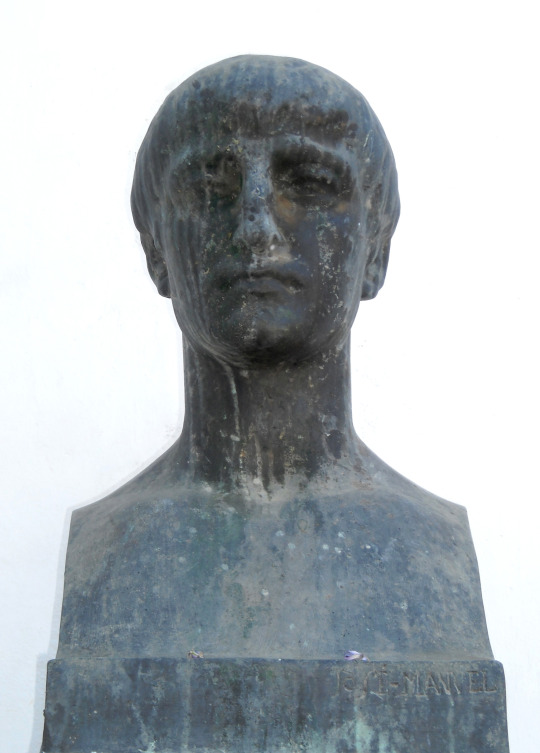
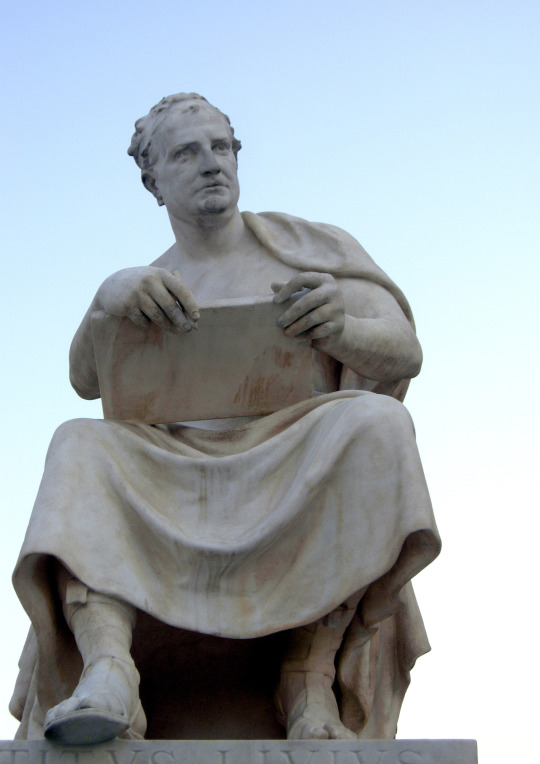
Propaganda under the cut!
Lucan Propaganda
Really said "what if the Aeneid was more fucked up" and honestly, respect
Every line of the Bellum Civile goes So Fucking Hard. The most metal piece of poetry out there
It's got something for everyone: witches, necromancy, archaeology, blood and guts, aristeia, ghost messengers, siege warfare, dubious protagonists, Ptolemies...
Livy Propaganda
Wanna teach your kids some exempla virtutis? Look no further
Writes in really fantastic periodic style
An undergrad in a class I TA’d for once referred to him in an essay as “my homeboy Livy,” and frankly there is no review more glowing than that
#tagamemnon#latin literature tournament#classics#livy#lucan#bracket#latin#tournament polls#tumblr polls#latin literature#ancient rome#epic#history
51 notes
·
View notes
Text
Algol and Perseus
The rescuer and the demon
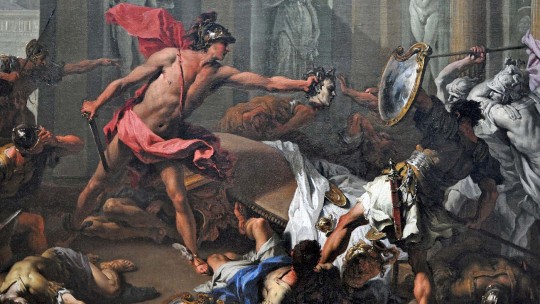

Sebastiano Ricci Antonio Canova
Algol is the beta star of the constellation Perseus, currently sitting at 26° Taurus, known as “the demon star” or "blinking demon", its name comes from the arabic Al Ghul meaning "the demon". To hellenistic astrology it represents Medusa’s head, which Perseus holds on one hand, while on the other he has his sword. An important characteristic of Algol is that its glow has a regular variation, it loses half of its brightness for hours and then it gains back. It was believed by astrologers to be an eclipsing star, which means that another non-visible body would be orbiting it and therefore eclipsing its light from time to time. They were half right, because it was later discovered to be an eclipsing star system, and that Algol was actually 3 stars, just like the Gorgon sisters are three: the imortals Stheno and Euryale, and the mortal Medusa. This is such a hallmark of Algol that it gave its name to its class of eclipsing variable: Algol variable.
Eclipses are associated with death, basically because light in astrology is life-giving, and loss of light is death. But it’s interesting that it's frequently associated with the "demonic", capital punishment and decapitation. Algol is telling a story about the decapitation of a “demon”, just like the lunar nodes (Rahu and Ketu) do in the Jyotish tradition when they cause eclipses. Ptolemy only tells us that the constellation of Perseus is like Jupiter and Saturn. Although Robson agrees with Agrippa about Algol specifically being of the nature of Saturn-Jupiter, and “the most evil star in the heavens”, causing a lot of fear whenever we see it activated in a chart. But I’m not here to scare anybody, don’t worry. It’s difficult, but I’ll try to lighten this up, because the most overlooked fact about Algol is that it also protects and can make revolutions and revolutionary heros.
"Perseus is like Jupiter and Saturn: but the nebula, in the hilt of the sword, is like Mars and Mercury." (Ptolemy - Tetrabiblos)
"It causes misfortune, violence, decapitation, hanging, electrocution and mob violence, and gives a dogged and violent nature that causes death to the native or others. It is the most evil star in the heavens" (Vivian E. Robson - The Fixed Stars and Constellations in Astrology)
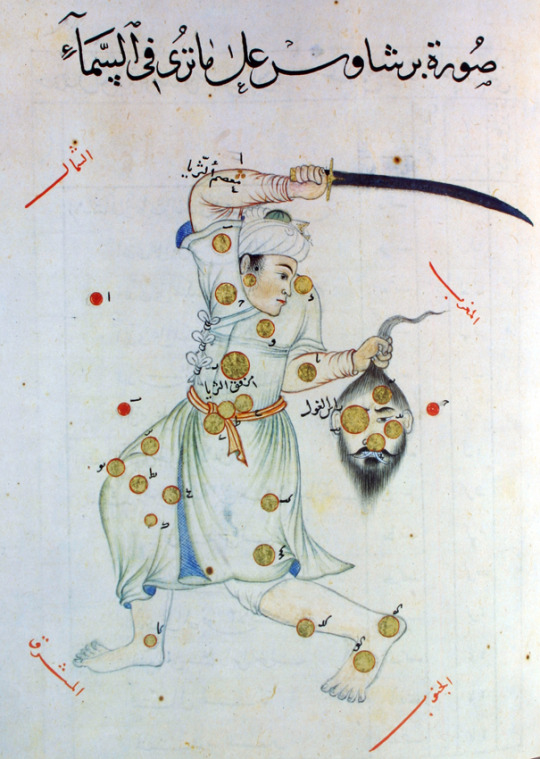

Illustrations from Al-Sūfī's book of fixed stars
Eletrocution or electrical problems are an issue with eclipses and apparently also eclipsing star-systems like Algol. This is noted by Christopher Warnock about his Algol talismans:
"I have had multiple reports and have myself experienced Algol’s tendency to cause electrical and electronic interference when the talisman is first used. I mysteriously lost my Internet connection for an hour and my electronic thermostat died. One user had his entire block lose power. Less frequently but still regularly clients have reported that while wearing their Algol talisman, “weird” or “freaky” people took one look at them and fled."
(Christopher Warnock - Fixed star, Sign and Constellation Magic)
Other one of its proeminent themes is vengeance, or the dichotomy of justice vs vengeance, but the effect of reflecting back evil that's sent towards its direction, or of ending curses describes it better in my opinion. About the images of the fixed Behenian stars, Agrippa says that:
“Under Caput Algol, they made an image whose figure was the head of a man with a long beard, having a bloody neck. This brought the good outcome of petitions, gave the bearer boldness and nobility, preserved members of the body from injury, helped against sorceries, and reflected evil attempts and evil incantations from enemies”.
(Agrippa's Three Books of Occult Philosophy - Eric Purdue's translation)

Piero di Cosimo
This protection side of the star is illustrated by the story of the champion Perseus not just decapitating the demon but using its head to free Andromeda from her chains and saving her and her city from another monster, and then Athena herself starts using the head of Medusa as a symbol on her shield. As established, this is a star of the nature of Jupiter and Saturn. The nature of Saturn is evidenced even by the names given to the star: demon, cacodaemon, which is also the greek name for the 12th house. Imprisonment, monstruosity and madness are clearly the most important Saturn and 12th house themes. But Algol is a protective star, particularly in astrological magic, although I'll show how this kinda manifests in nativities as well. Algol is mainly of a jupiterian nature, that's why it does liberates. The head is an evil daemon but also a protection amulet. This is interesting regarding the eclipsing factor and the similarity of the significations with the Jyotish Rahu and Ketu. In western astrology the nodes are considered to have effects like Jupiter and Saturn, and the topic of imprisonment-liberation is explored in the dynamic of the two*.
With the new interpretations of the Medusa myth, some astrologers say that Algol can be about "female rage" or "dark feminine", or "feminine jealousy" etc. I think this is one of the stories that people mix the astrological meaning with the morality of the greek myth associated with the star the most. The greek myth is not really the star and the star is not the greek myth. In my opinion, you always must take into consideration that some things can be just the way the greeks or romans viewed a certain theme, and of course they would put a violated woman to represent a monster on a mindless vendetta, and it's not meant to be complimentary. I believe that's already way beyond Algol's effects, it could be just their misogyny projected onto the stars. I can think of examples where I can see that kind of story taking place, but that doesn’t mean that the star is about those things, but just that this is one possibility because we live in patriarchy and things around women's issues can get ugly in an Algol manner. The star can be about capital punishment, monstruosity, madness, captivity, violation, injustice, vengeance, evil daemonic influences etc, but it's not really about cishet women. So, even though I’m also using the greek myth here, I’m not giving the most importance to the detail that it is a story about a woman receiving unfair punishment and that there's a lack of comradery between women, because I'm interested in the star beyond what greeks and romans said, because the stars can’t be represented by just one hegemonic narrative. A lot of other cultures had their different stories about Algol, the Medusa one isn’t special to the point that we could assume every detail about it, even its moral issues (which are also in this case suffering a bit from anachronism), has meaning for the star associated.
Perseus is a spring time constellation very near the bull (taurus), and that may sound too nice for such a scary one. But in babylonian astrology, the stars of Perseus actually formed the constellation of the Old Man, who also held a decapitated head and a rod instead of a sword. Of it, Gavin White has an interesting perspective to share:
“At this time of natural abundance, the earth was thought to ‘open up’ in order to yield her bounty, but to the archaic mind this opening up was accompanied by a host of dangers, chief of which was the potential pollution from the dead who could gain easy access to the upper worlds at this pivotal time. In light of this belief, I would suggest that the Old Man, with his wand and prophylactic head, is banishing the ghosts of the old year and driving them back to the underworld.”

Illutration from Gavin White's Babylonian Star-Lore
There's a lot of examples of charts for literal decapitation or capital punishment, injuries to the head or neck area as obvious manifestations of the star: The most famous is probably the catholic Saint George, who is said to have been executed by decapitation on April 23 back when that was the time of year when the Sun would conjunct Algol, and he later became associated with the constellation. Back then, Algol was at 2° Taurus. Gianni Versace, who had Algol on the descendant, famously made Medusa the logo of his brand and also died with a bullet to the head. Freud had Mercury with Algol, his 8th house ruler, and he died with throat cancer. Nick Yarris, who spent two decades on death row after he was wrongfully convicted of murder, has the Sun with Algol. Patrick Henry had Jupiter, and he was a murderer whose case influenced the abolition of the death penalty in France, which was done by the method of guillotine until its abolition. He was defended by Robert Badinter, who was an activist against the death penalty and could sucessfully propose its abolition in 1981. Badinter has Jupiter with the alpha of Andromeda in the first house. France has a thing with decapitation, some of the charts for its republics have either Algol or Mirfak activated, the alpha star of Perseus.
Algol and Madness
But I want to talk about Algol's special relationship with madness, in the demonized/criminalized sense, because after all, "the demon" is unwanted, it frequently represents the marginalized and their opression. In Brazil's history, especially during the military dictatorship organized and imposed by usamerican capitalist imperialism, asylums imprisoned and tortured mainly black people, women and queer people. Some asylums got so overwhelmed that they became concentration camps, like the famous case of Hospital Colônia in Barbacena, known as the Brazilian Holocaust case, where people died by the thousands from starvation, hypothermia, anemia, STI's, untreated diseases from the lack of hygiene etc. Some important psychiatrists, psychologists, psychoanalysts have Algol activated by some planet. Freud has Mercury, Fritz Perls has Jupiter, David Healy, who literally has a book titled "The Decapitation of Care", has Venus. But what's more interesting to me is the protection element of Algol in some cases and its role in mad liberation movements, after all, Perseus is a liberator. Algol shows up in very important people in the pysch field who question medical power and have antipsych views, and on important events of the psychiatric reform.

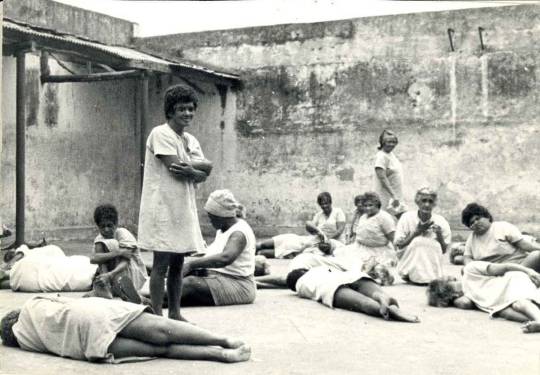

Hospital Colônia de Barbacena - MG
Franco Basaglia, the main responsible for the dismantling of psychiatric hospitals and for the psychiatric reform in Italy and for inspiring the one in Brazil, had the Moon with Algol in the 10th house, representing his deeds, while ruling the 12th. In Italy, the Law 180 (Basaglia Law), the Psychiatric Reform law that determined the progressive extinction of asylums throughout the italian territory, was sanctioned with the Sun on Algol. In Brazil, on May 18, 1987, the exact day of the year that the Sun conjuncts Algol, a meeting of mental health workers at a conference was the major milestone for Brazilian health reform and the anti-asylum movement. And since that event, May 18th has become our national anti-asylum movement day, and it becomes more and more culturally relevant as a day to discuss psychiatric reform and the fight to guarantee the rights and autonomy of mental patients.



Marches on May 18th
An important activist, Austregésilo Bueno, born with the Sun with Algol, survivor of compulsory hospitalization in asylums in the 70s, wrote a book "Canto dos Malditos" about his horrible experiences as a psychiatric patient treated with eletroshock therapy (another one of Algol's effects). He had his book adapted to film and his story played by the actor Rodrigo Santoro, who has Algol on the Ascendant. The name of the film is Brainstorm in English, but I find the original "Bicho de Sete Cabeças" much more compelling. It's a truly devastating story, and it's the story of thousands unfortunately.
One thing about Saturn and madness is the recurring idea of wearing masks. Masks and theatre have always been associated with Saturn. Saturnalia was a roman festival where all the roles switched, where kings pretended to be fools and fools pretended to be kings. In modern astrology Saturn ended up associated a lot with a raw and harsh reality, disregarding the most mystical and unreal characteristics of Saturn that have always been present. Although life, reality, identity and reason are always a performance, we're always wearing a mask and performing life. There's a point in the movie "Bicho de Sete Cabeças" when the protagonist is having a difficult time on his first days of being an inmate, he's fighting too much against the forced treatment and expressing too much unsatisfaction with his imprisonment, thus getting even more forcebly medicated and punished by the staff. At this point one of the older inmates shares an important advice with him:
"You have to pretend, who in this world doesn't pretend? You have to say that you're in a good mood, you have to say that you're not hungry, you have to say that you don't have a toothache, you have to say that you're not afraid, otherwise you can't do it, you can't do it. No doctor ever told me that hunger and poverty can lead to mental disorders, but those who don't eat become nervous, those who don't eat and see their family go without eating can go crazy, a discontentment can lead to madness, a death in the family, the abandonment of the great love. We even need to pretend to be insane when we're insane, pretend to be a poet when we're a poet."
It's a powerful speech about the farce of medicine's ownership over the subject of madness, the farce of reason and that it must subjugate or dominate madness. Pretending and acting out the platonic ideal behavior at all situations under all circumstances, as if it's normal, that's the only way anyone is seen as sane.



Bicho de Sete Cabeças (2000)
Another important date in brazillian history is the 13th of May 1888, the day of the passing of the law that abolished slavery, which also had Algol activated by the Sun. This was obviously not the definite end of slavery and not the end of the struggle of black brazilians, just like the Basaglia Law didn't mean mad liberation, but I'm just demonstrating how powerful Algol is to protect from evil and put an end to injustice in an official and legislative manner. Like Saint George defeating the dragon, Perseus defeats a monster that is impossible to defeat, the "impossible victory" and liberation is recurrent in the stories linked to it. Systemic opression and injustices a lot of times seem like impossible problems, it becomes harder and harder to imagine a world where they don't exist, but Algol events revolutionize the impossible.
"The important thing is that we have proven that the impossible becomes possible. Ten, fifteen, twenty years ago it was unthinkable that a mental hospital could be destroyed. Maybe mental hospitals will return to being closed and more closed than before, I don't know, but in any case we have demonstrated that the mad can be cared for in another way, and testimony is fundamental. I don't think that the fact that an action manages to energize itself means that it has been won. The important point is another, it is that now we know what can be done."
(Franco Basaglia - Conferenze brasiliane)
An important honorable mention should be made to Carlos Marighella, a guerrilheiro in the resistance of the brazilian military dictatorship who was executed before he could see our democratization. He had Mars with Algol.
"The urban guerrilheiro is an implacable enemy of the government and inflicts systematic harm on authorities and men who dominate and exercise power. The main work of the urban guerrilheiro is to distract, tire and demoralize the military, the military dictatorship and repressive forces, and also attack and destroy the wealth of north americans, foreign managers, and the Brazilian upper class. But the fundamental and decisive characteristic of the urban guerrilheiro is that he is a man who fights with weapons; given this condition, there is little chance that he will be able to pursue his normal profession for a long time or the reference of the class struggle, since it is inevitable and necessarily expected, the armed conflict of urban guerrilla against the essential objectives:
A. The physical extermination of the leaders and assistants of the armed forces and the police.
B. The expropriation of government resources and those who belong to the big capitalists, landowners, and imperialists, with small expropriations used to maintain the individual urban guerrilheiro and large expropriations for the support of the same revolution.
(Carlos Marighella - Manual do Guerrilheiro Urbano)
Algol in Cannes
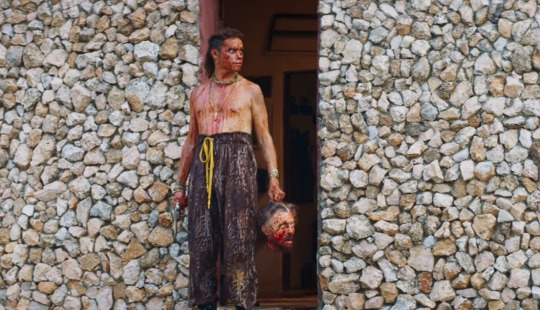
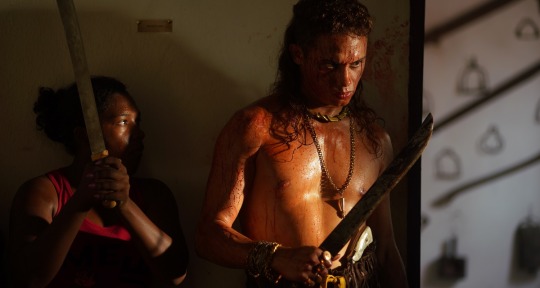
Lunga in Bacurau (2019), the first queer Perseus I know. The actor Silvero Pereira has Venus on Algol.
I’ve said here before how much I love Bacurau. The movie premiered in Cannes, on May 15, 2019, at 10 pm**. This is a chart full of fixed stars, with the Sun with Algol in the 6th house. You'll find in the film the Algol classic of extreme injustice being overcome. But one curious thing is that the Cannes Film Festival always happens around the same time of year when the Sun is at the last degrees of Taurus and beginning of Gemini, making a lot of the movies premiered at Cannes have Algol activated. And it shows. It’s a great opportunity to watch how varied the Algol themes can be. On that same year of 2019, they had: THE DEAD DON’T DIE by JIM JARMUSCH, a pretty obvious Algol movie about zombies, whom you defeat by cutting off the head, of course; LES MISÉRABLES by LADJ LY, inspired by a real-life event of police violence that inspired the 2005 riots in Paris, it seems to have a very radicalized discourse about raging against violent injustices; ATLANTIQUE (ATLANTICS) by MATI DIOP has dead unpaid workers coming back as spirits possessing their city’s inhabitants to take vengeance on the tycoon who withheld their payment; LITTLE JOE by JESSICA HAUSNER is a film about a lab created flower that alters people's behavior in strange ways, and these last two kinda have the feeling of that "spring danger" Gavin White talks about. DOLOR Y GLORIA (PAIN AND GLORY) by PEDRO ALMODÓVAR has Antonio Banderas as the protagonist who develops dysphagia, caused by a caucified growth in his neck. Etc. And these are all just some of the 2019 films. I haven't watched most of them, but you can always look for the films which had their first screenings around 14-20 of May and they'll be rich in Algol content.
So, I'll leave you with that: a bunch of movie recommendations. Thank you for reading.
--
*Adam Elenbaas has my favorite content on the subject of the nodes or Rahu-Ketu.
** You can research the screening guide for an edition to find the time.
#algol#hellenistic astrology#traditional astrology#perseus#mirfak#fixed stars#taurus#taurus sun#taurus moon#taurus asc#sun with algol#astrology#astrology readings#agrippa#ptolemy#astrological magic#astro magic#andromeda#medusa#12th house#saturn#cacodaemon
78 notes
·
View notes
Text
true names are one thing but seriously, just what is with the intimacy of calling your Servant by their class name? like with rin's 'my archer' is SN, guda calling their servant by the class name feels so much intimate in a different context from rin's. because true names are more common, its more tended to be used to avoid confusion, especially when there are servants summoned as younger/alter/different version of them. so whenever guda says: "come to me, [insert class name]" during a high strung moment and its the person they had in mind, its just soooo good??
not many people know of it much... yet? but the times guda says this is during calling out to Artoria Caster, Ptolemy, Mash (my first Servant), and especially of course, "My Avengers" ...... before i start puking, i have to calm my heart down....
24 notes
·
View notes
Text
Just some silly thoughts about chapter 6 of PG
The scene where bart gets summoned to Nat's office in chapter 6 of Ptolemy's gate, reads exactly like a couples therapy session between two people trying to save their marriage.
Bart's the dissatisfied house spouse that wants Nat to open up about their struggles and is threatening divorce if Nat won't go through with it; and Nat's the stoic husband that refuses to cooperate with the therapy, and instead throws himself into his work so he doesn't have to admit he has a vulnerable side...or...emotions -despite the fact that his stressful job is a major reason for the strain in their relationship, and his treatment of his spouse when he gets home.
And poor Piper is the woman who took a psychology course because she wanted to help people, and is just realising that her class did not prepare her properly for the chaotic energy that is the soon-to-be-divorced Bart and Nat.
I think if they had a more suitable mediator at this point, ie Kitty, they might have actually gotten rid of some the tension between them and sorted their shit out way sooner.

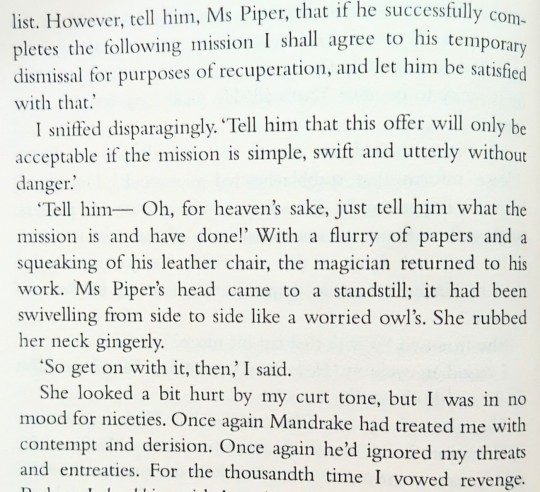
If anyone has ever read The Chrestomanci Series- specifically the lives of Christopher Chant (which I highly recommend btw) this whole interaction reads exactly like Christopher's two parents arguing and passing notes between to each other through the servants, despite them actually loving each other a lot but being too proud to admit they want to stop fighting.
#It might just be me projecting one beloved book onto another😅#Please tell me someone else interpreted it this way 🥺#bartseq#bartimaeus#bartimaeus trilogy#bartimaeus sequence#nathaniel underwood#chrestomanci#liveblogging
25 notes
·
View notes
Text
'So, I conclude, the Greeks did believe in their robots. Automata had mythic precedents and the rudiments of a mechanical explanation working in their favor; finally, they answered serious questions of a political and economic order. They were the kind of objects that a culture could invent to explain itself to itself, and that it could use to express its utopian wishes. Why, then, did these wishes come true in a way that jarred utterly with what a reader of Aristotle, or indeed anyone who had seen the Therioi, would have expected?
In the Hellenistic period and after, when the science of mechanics had developed a working knowledge of gearing, pneumatics and leverage that permitted the construction of working automata, the technical know-how that might have gone towards creating Aristotle’s animated tools appears to have gone instead towards orchestrating impressive parade floats. Here is one early instance, from the reign of Ptolemy II: There followed a statue of Nysa…that stood up by a mechanism, without anyone touching her, and, having poured out milk from a golden phial, sat down again. In her left hand it held a thyrsus adorned with ribbons. And she was crowned with ivy made of gold and with grape clusters made from gemstones. If a robot like this could do useful symbolic work, it hardly fulfilled the revolutionary promise of the automata envisioned by Crates and Aristotle. Automata were to become, instead a standard element in the apparatus of Hellenistic rule. These were thaumata indeed, designed, like their predecessors the puppet theatres, solely to impress. Another Veynian concept, this time one with which I have no quibbles: these automata were part of the apparat of Hellenistic kingship, one of those trappings of power that did nothing, that only communicated the cold “facts” of power relations.
In this narrative, everything happens as if the “realization” of robotics had thrown cold water on a tradition of wild speculation about the possibilities embodied in a technological advance that had been conceptualized but not yet achieved. I am skeptical of such an explanation for many reasons, but chiefly because it does not account for what we have seen was a decisive change in the political and class valence of automata—from liberators of slaves to tools for monarchical rule. What iron law of progress guarantees that a “disappointing” but real technology should become the property of kings, while the radical hopes expressed in science fiction should belong to the masses?
Actually, the reasons for this disappointment are exactly the ones that Marx foregrounded in his commentary on the Aristotle passage with which I began this essay. Anyone can own an imaginary robot—or, I suppose, in Marx’s terms, an imaginary steam-powered loom—but, when it comes to building the real thing, technology follows capital, or power, to use a less anachronistic and more general term. Machines that could liberate if they were common property become, in the hands of a few, new tools for subjection. The Greeks’ faith in their robots was betrayed by this iron law of economics: technological development tends to magnify, rather than repair, the structural inequalities inherent in a given mode of production. Then, as in Marx’s day and now, there were no magic—or mechanistic—bullets for fixing problems of a social order. To say, as Aristotle said, that the only escape from slavery was technological was just the same as claiming—which Aristotle did, notoriously, elsewhere—that slavery was natural, and bound to endure forever.
So the explanation advanced by Vernant, Finley, and all the rest for classical antiquity’s “technological stagnation” can be reframed, and reposed, in a way that brings it closer to the truth. In this instance, the social relations produced by an economy based on slavery provided the raw materials for the development in the Athenian cultural imaginary of a piece of technology, the automaton. But this technological advance could only be realized with the help of capital that had been accumulated precisely by individuals and groups exploiting social relations of enslavement. It was, then, necessarily going to be realized in a “disappointing” form—certainly not in a form that could radically disrupt those social relations, as Aristotle had imagined it doing. The easy availability of slave labor was not what blocked technological development along such lines. The interest of a slave-based economy in its own preservation simply dictated that technologies as expensive and craft-intensive as automation were not going to be used in a revolutionary way.'
worth reading the entire thing imo!
#i dont know if i agree with everything he's saying and either way im not qualified to disagree or agree TBQH. but very interesting#more Qualified Mutuals i would love your opinions on this
54 notes
·
View notes
Note
i did my honours degree in ancient history at a uni with a very small ancient history section in the library, so i got into the habit of grabbing every book i could find on a given topic (all four of them) to see if i could find anything useful and then check them on google scholar etc to see who else had cited them, which meant i often dealt with books that had been there for a while. this backfired on me when i was writing about the ptolemies and one book in particular referred to the macedonians as the "master race". quickly flipped to the front and saw it was published in like 1938. makes sense!
now by itself that would be mildly inconvenient, but i'd just chuck it in the "don't use" pile and move on - the problem came when i was retelling this to a couple of classmates the next day, and one of them asked me what the problem was with the phrase "master race" being used :| fourth year of university. studying history. not knowing the problems with the term "master race". it never ceases to boggle me where people's gaps in understanding/knowledge are. (see also: the guy who asked me in my modern history class why there weren't any movies about how good the vietnam war was, why all of them are about how bad it was.)
Exactly lmao, there's always that one guy that takes everyone by surprise (also, big yikes on both accounts)
50 notes
·
View notes
Text
24 notes
·
View notes
Text
Also those astronomy notes are likely for an intro level class… they have really basic info like definitions of aperture & the Bohr model & Ptolemy??
This is like if I posted my genetics notes & it was exclusively about who Darwin was & a few punnet squares.
8 notes
·
View notes